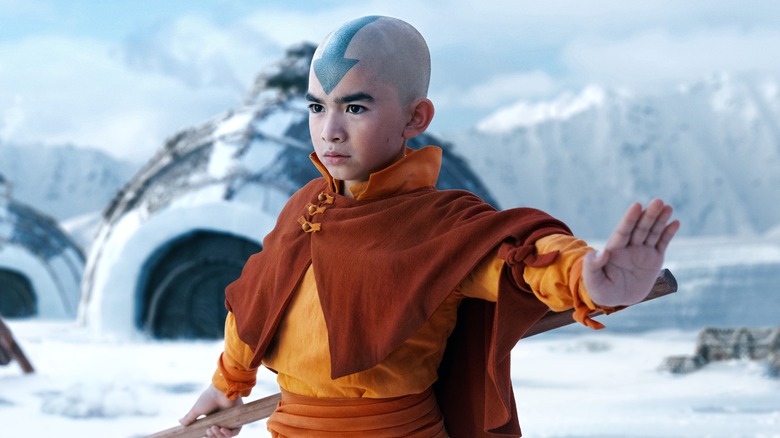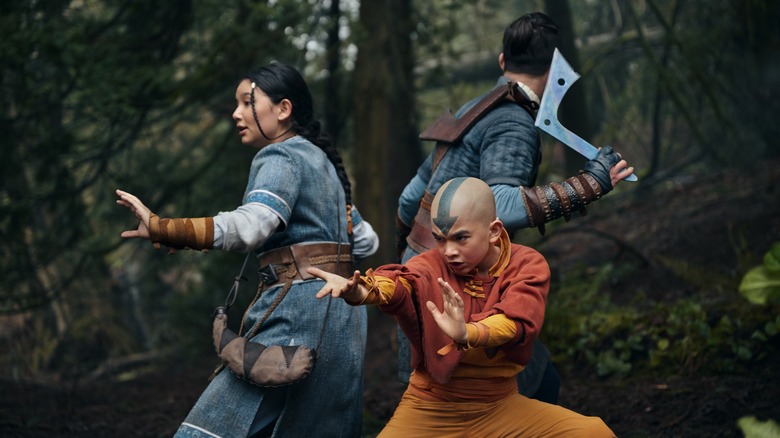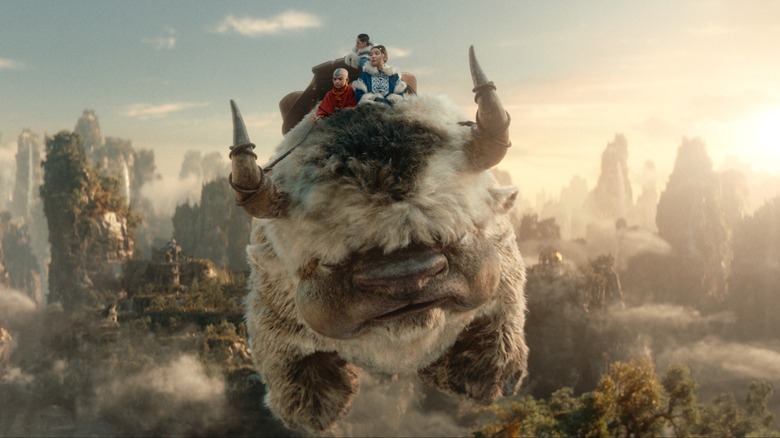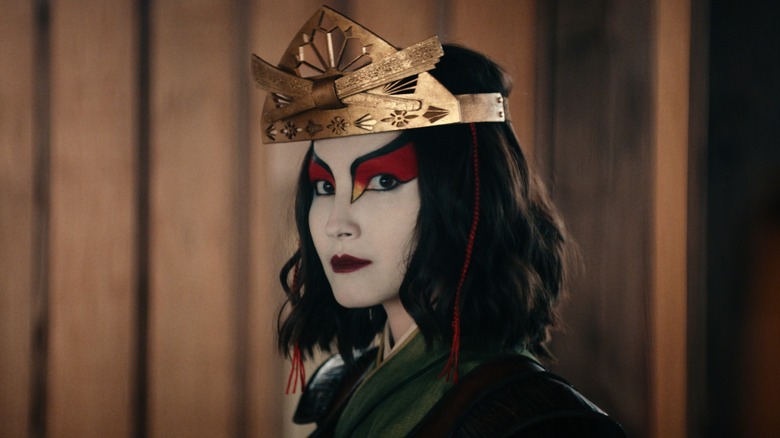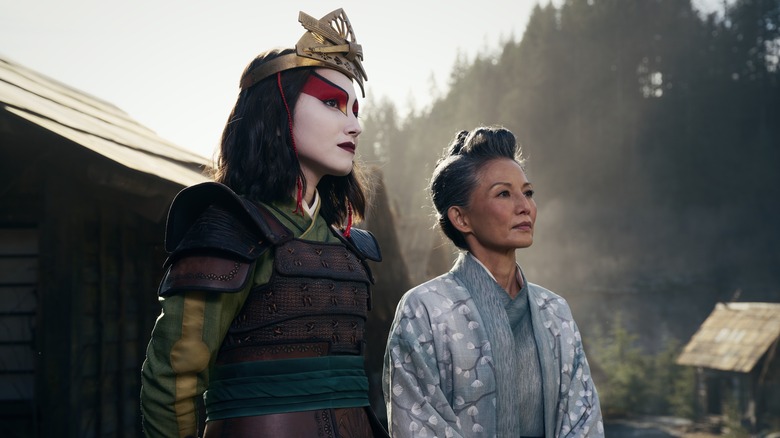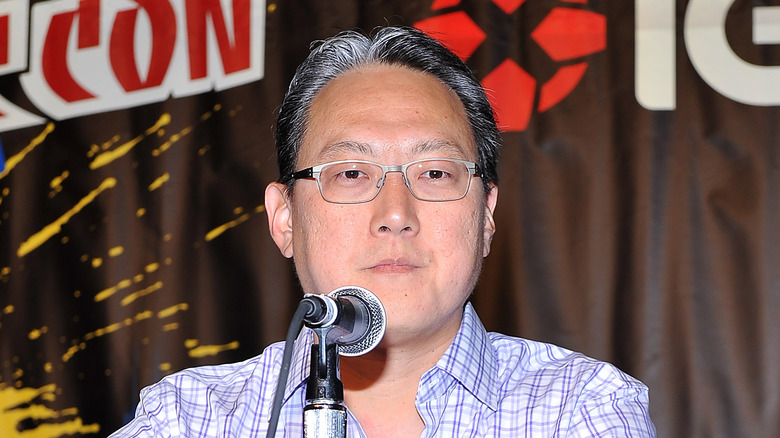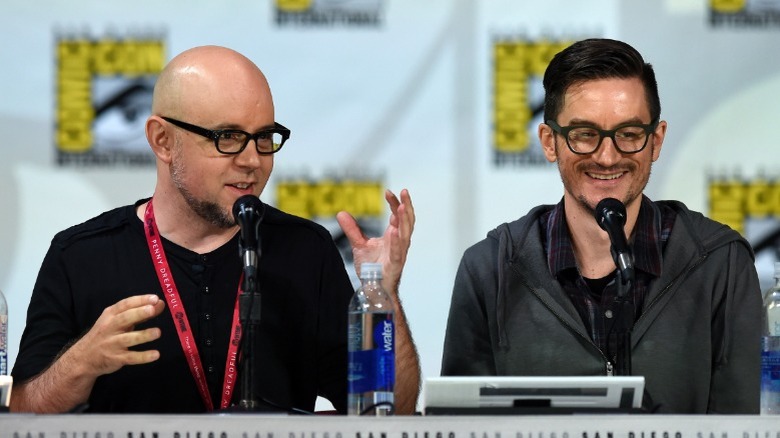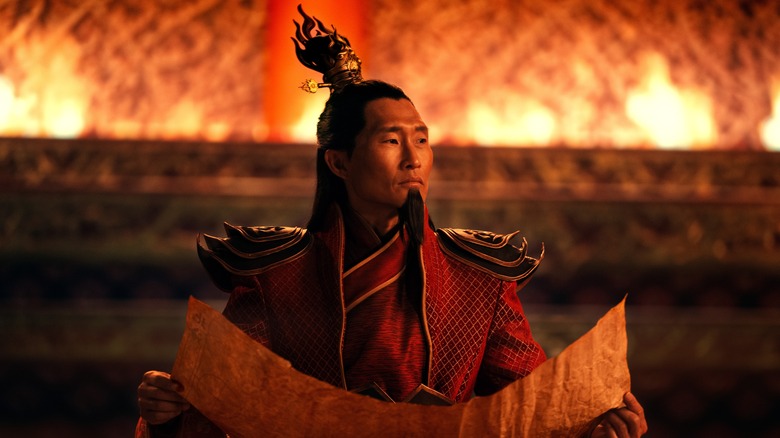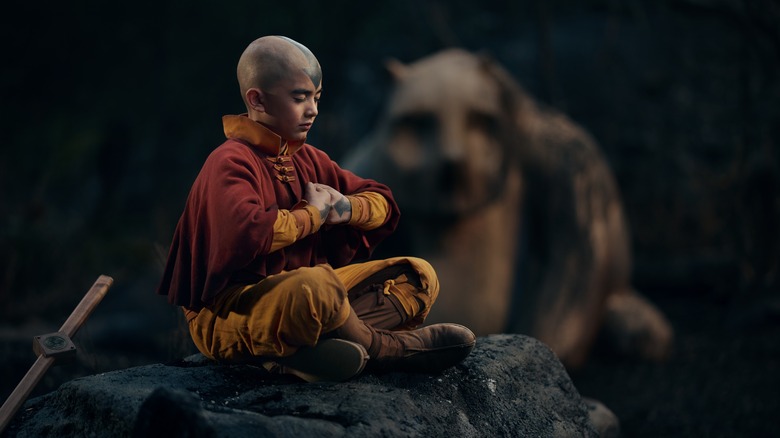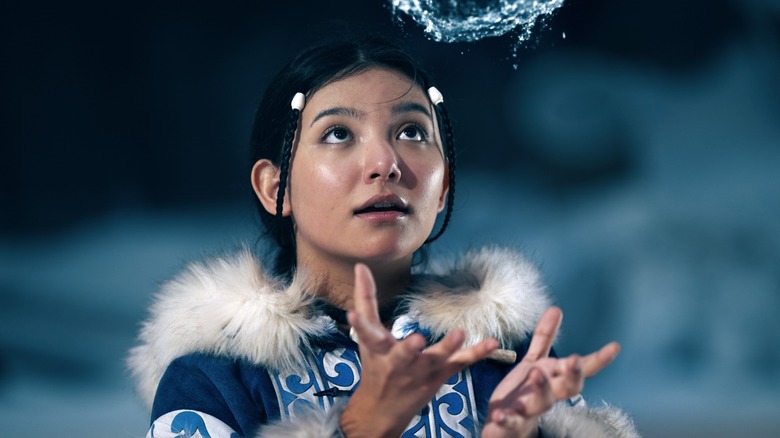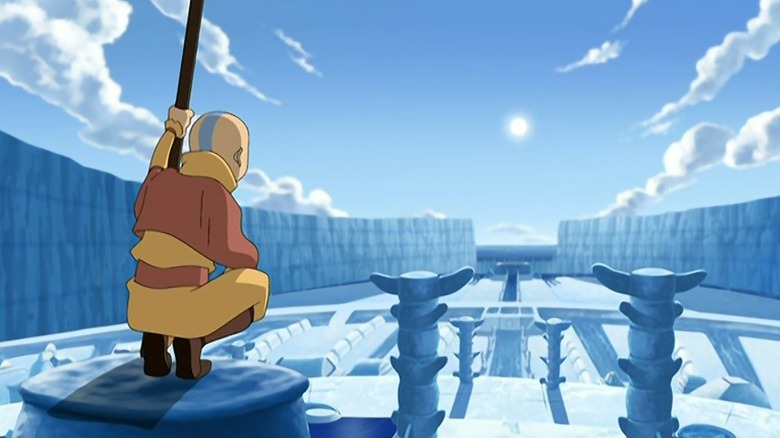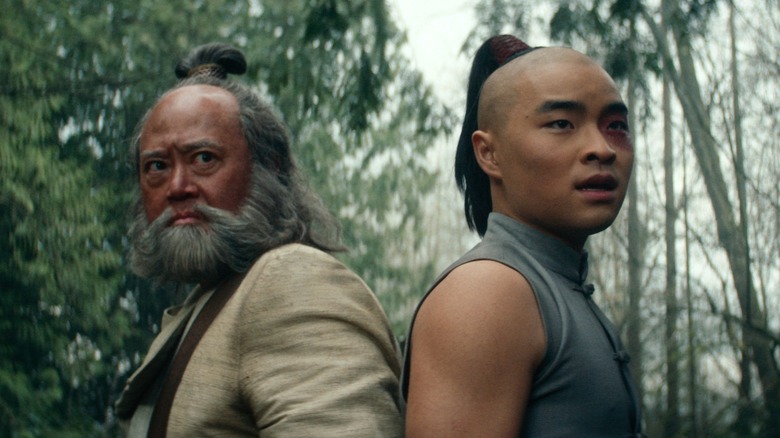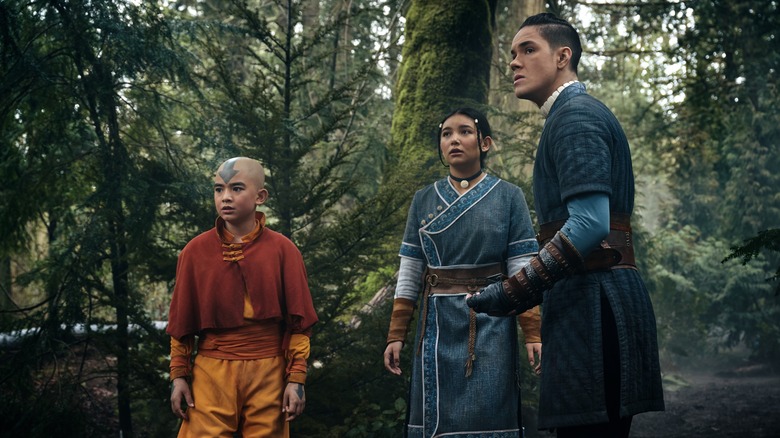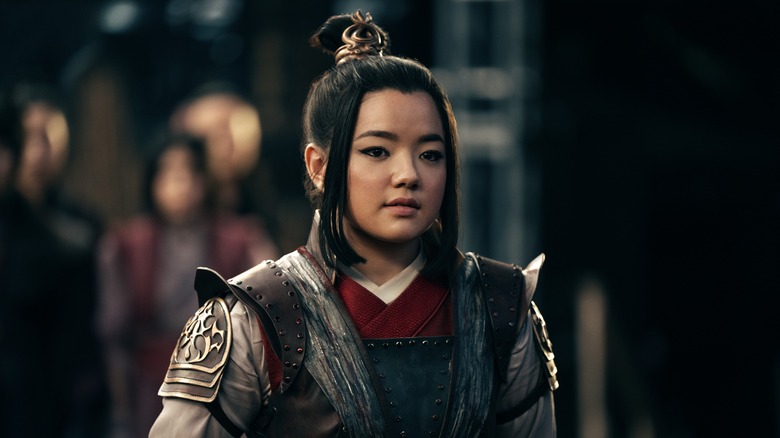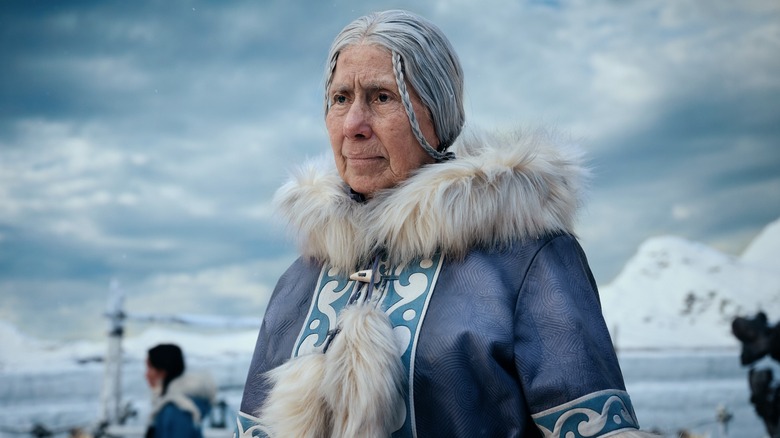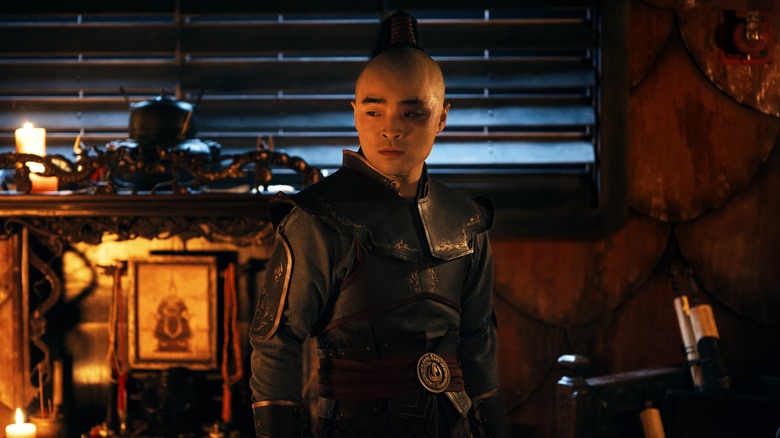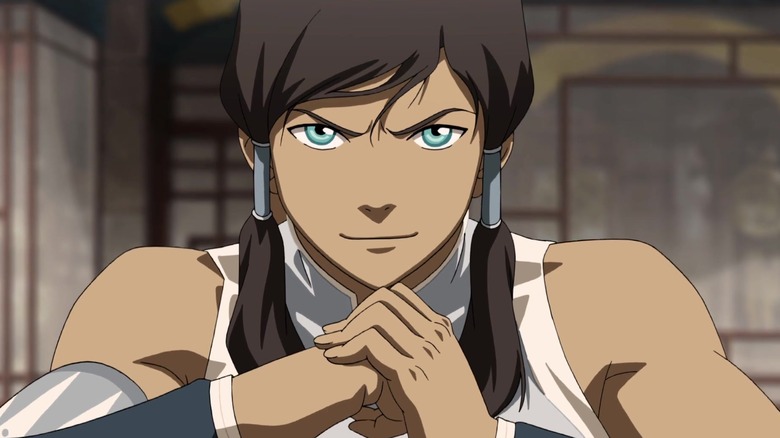Netflix's Live-Action Avatar The Last Airbender Release Date, Cast, Plot, Teaser Trailer And More Details
We may receive a commission on purchases made from links.
"Avatar: The Last Airbender" is widely regarded as one of the greatest animated series ever made. Its legend has only grown, now that a new generation of fans have discovered it on Netflix. The series has proved to be so popular on that platform, in fact, that in September 2018, Netflix announced that they had ordered a live-action adaptation of the beloved saga. Though fans were scarred by M. Night Shyamalan's 2010 attempt to bring Aang's story into three dimensions, they were nevertheless intrigued by this new project. It helped that the series' original creators, Michael Dante DiMartino and Bryan Konietzko, expressed genuine enthusiasm: "We're thrilled for the opportunity to helm this live-action adaptation of 'Avatar: The Last Airbender,'" the duo remarked (via TV Guide). "We can't wait to realize Aang's world as cinematically as we always imagined it to be."
Over the course of the next few years, this live-action adaptation rolled into production. The road hasn't always been smooth; DiMartino and Konietzko's high-profile departure from the series was especially shocking to fans. But finally, this beloved saga is nearing its debut date. Excited to jump into Aang's world once more? Then stick with us, because we're diving into everything we know about Netflix's live-action adaptation of "Avatar: The Last Airbender."
When will Netflix's Avatar: The Last Airbender be released?
Netflix's "Avatar: The Last Airbender" will debut on February 22, 2024. Fans have been waiting for this date for quite some time, to put it mildly. Many years have passed since the project was first announced in 2018, and some of them offered virtually nothing in the way of production updates. For a long time, the entire series seemed more like a far-off dream than an actual production we might get to lay eyes on some day.
But now, those many months of waiting are behind us. And in fact, with the arrival of the first teaser trailer and vivid stills of the series, they seem positively justified. Netflix's take on "Avatar: The Last Airbender" looks to be a sumptuously realized adaptation of the original story, full of gorgeous costumes, elaborate environments, and complex visual effects. If it took a while to get them all just right, well, so be it.
What is the plot of Netflix's Avatar: The Last Airbender?
Like the original cartoon, Netflix's "Avatar: The Last Airbender" takes place in a fantastical world dominated by four great nations: the sprawling Earth Kingdom, peaceable Air Nomads, tight-knit Water Tribe, and imperialistic Fire Nation. Certain people in every region are capable of manipulating their nation's associated element through a wide variety of martial arts known as "bending." The Avatar, who is the only person capable of bending all four elements, connects the material world to the Spirit World, and keeps both in balance.
The world is suffering a serious lack of balance when the story begins, as the Avatar, a 12-year-old Air Nomad named Aang, has been missing for 100 years. Everything changes when Water Tribe siblings Katara and Sokka stumble upon him and his flying bison, Appa, frozen in stasis in an enormous iceberg. Aang must now contend with a world ravaged by the Fire Nation's century-long campaign of conquest.
Notably, the Netflix series will not be a one-for-one adaptation of the cartoon. "We don't start the show the way the animated series starts," showrunner Albert Kim told Entertainment Weekly. "That was a conscious decision to show people this is not the animated series. We had to sometimes unravel storylines and remix them in a new way to make sense for a serialized drama." He elaborated further to Netflix, noting, "Netflix's format meant we had an opportunity to reimagine a story that had originally been told in self-contained half-hour episodes as an ongoing serialized narrative. That meant story points and emotional arcs we'd loved in the original could be given even more room to breathe and grow."
Who is starring in Netflix's Avatar: The Last Airbender?
A good cast is critical to the success of Netflix's "Avatar: The Last Airbender." M. Night Shyamalan's infamous adaptation of the series earned passionate criticism on this front, as it cast multiple white actors as characters of color. Series creators Michael Dante DiMartino and Bryan Konietzko made it clear from the beginning that Netflix's take would not be repeating this mistake.
The lead trio of good guys will consist of Gordon Cormier as Aang, Kiawentiio as Katara, and Ian Ousley as Sokka. While all three actors are at the beginning of their careers, fans might know Kiawentiio as Ka'kwet from "Anne with an E" and the titular heroine of "Beans." Dallas Liu, Elizabeth Yu, Paul Sun-Hyung Lee, and Daniel Dae Kim will bring the Fire Nation to life as Zuko, Azula, Iroh, and Ozai, respectively. Sun-Hyung Lee's presence is a hugely good sign: He's charmed millions of fans as Appa on "Kim's Convenience" and Carson Teva on "The Mandalorian." Kim, who's starred in "Hellboy," "Raya and the Last Dragon," and "Hawaii Five-0," is another jewel in the series' crown. Notably, this won't be his first trip to "Avatar"-land: He played General Fong in the original animated series and Hiroshi Sato in "Avatar: The Legend of Korra."
The supporting cast is also full of luminaries. "Community" star Danny Pudi will portray the kooky Mechanist, whose inventions are as brilliant as they are dangerous. "Star Trek" legend George Takei will play the fearsome spirit Koh, who steals the faces of those unlucky enough to cross his path. Amber Midthunder, who blew audiences away with her star turn as Naru in "Prey," will portray the soulful Princess Yue. This is a seriously stacked cast, and fans couldn't be happier.
Will there be any new characters in Netflix's Avatar: The Last Airbender?
While fans are naturally eager to see what the live-action versions of the original "Avatar: The Last Airbender" characters will be like, not all major characters in the new show will hail directly from the animated series. There will be at least one brand-new character in Netflix's "Avatar," and that will be Yukari, played by Tamlyn Tomita.
Described in the casting announcement (via Deadline) as "Suki's mother and the fiercely protective mayor of her small village on Kyoshi Island," Yukari will fill a small but significant narrative gap in the original Kyoshi Island plotline. The village's political and social organization are very vaguely defined in the original show. There is a leadership figure in the character of Oyaji, voiced by James Sie, but his role in the plot is very small; the episode came early on in the animated series, before the writers' more adventurous forays into detailed political narratives. Yukari's presence suggests that the Kyoshi Island plot may be expanded and deepened beyond the more casual, adventure-of-the-week role it (initially) fulfilled.
Tomita is best known for playing Kumiko in "The Karate Kid Part II" and Waverly Jong in "The Joy Luck Club," though she has over a hundred credits on her impressive resume. Her other notable projects include "The Good Doctor," "Berlin Station," "The Day After Tomorrow," "The Man in the High Castle," and "Star Trek: Picard."
Who is Netflix's Avatar: The Last Airbender's showrunner?
Albert Kim will serve as showrunner, executive producer, and writer on Netflix's "Avatar: The Last Airbender." This wasn't always the case, however. When the show was first announced in September 2018, original series creators Michael Dante DiMartino and Bryan Konietzko were named as the adaptation's executive producers and showrunners. Fans were shocked when, in June 2020, they announced they had departed the project in a post on DiMartino's website.
In August 2021, Albert Kim emerged as the project's new showrunner. In a post to the Netflix website, Kim opined that his daughter got him hooked on the show, and that he's particularly excited by the possibilities inherent in modern visual effects and the Netflix model. But, while this potential excites him, he also noted that following Koneitzko and DiMartino was an intense experience. "You'd have to be an idiot not to be intimidated a little bit," he told Entertainment Weekly. "My first reaction after 'Hell yeah!' was 'Holy s***! Do I really want to do this?'" Luckily, he did get a little time to sit down with the original duo and talk about the story before they departed.
How involved in Netflix's Avatar: The Last Airbender are the original creators?
If there's one thing about the "Avatar: The Last Airbender" live-action series that continues to cause trepidation among fans, even after so many exciting announcements, it's the fact that Michael Dante DiMartino and Bryan Konietzko left the project. The departure of the co-creators, which inevitably left fans feeling uncertain about the Netflix series, was explained by DiMartino himself in an open letter to "Avatar" fans published on his website on August 12, 2020.
In the letter, DiMartino revealed that he and Konietzko had parted ways with Netflix following two years of involvement and that, for him, the decision was prompted by the realization that he "couldn't control the creative direction" of the show. He added: "Netflix's live-action adaptation of 'Avatar' has the potential to be good. It might turn out to be a show many of you end up enjoying. But what I can be certain about is that whatever version ends up on-screen, it will not be what Bryan and I had envisioned or intended to make."
So, what will be the extent of their contribution to the final product? Well, DiMartino and Konietzko still have writing credits on two episodes. The series premiere is written by them and showrunner Albert Kim. The sixth episode has a story by the creators and Ubah Mohamed, best known for her work on "Legends of Tomorrow." The teleplay for the sixth episode is credited to Konietzko, Marvel Comics writer (and the showrunner's daughter) Emily Kim, and Hunter Ries, a writers' assistant on Netflix's "No Good Nick."
Who is directing and producing Netflix's Avatar: The Last Airbender?
Netflix's "Avatar: The Last Airbender" will be directed by Michael Goi, Roseanne Liang, Jabbar Raisani, and Jet Wilkinson. This is an impressive bunch of people with experience in nearly every genre. Goi has directed episodes of "Empire," "Chilling Adventures of Sabrina," "Big Sky," and "Riverdale." Wilkinson is similarly prolific, having helmed installments of "The Chi," "Warrior Nun," "Daredevil," and "How to Get Away with Murder." Raisani's served as a second unit or assistant director on a number of celebrated shows, including "Game of Thrones" and "The Flash." Liang's directorial resume consists of generally lower profile work that is nonetheless impressive, including "Creamerie," "Friday Night Bites," and "Shadow in the Cloud."
All of these directors, save Jet Wilkinson, will also serve as producers on "Avatar: The Last Airbender." They'll be joined by Kurt Williams, Bonnie R. Benwick, Marc David Alpert, Ryan Halprin, Dan Lin, and Lindsey Liberatore. Taken together, this group boasts a truly massive filmography studded with excellent projects like "Maid," "Mission: Impossible — Ghost Protocol," "The Lego Movie," and "Logan."
Is there a trailer for Netflix's Avatar: The Last Airbender?
The teaser trailer for Netflix's "Avatar: The Last Airbender" begins with a solemn voice, describing how hard it is to hold onto a stable sense of self. History speeds by, blurring past and future together. There's only one way to weather it, the voice advises: "Always remember who you are." Fans certainly do a lot of remembering over the course of this trailer, which showcases some of the most iconic moments and locations in the series. We see Sokka and Katara approach the iceberg Aang has slept in for a century, the fantastical Earth Kingdom city of Omashu, and the Fire Nation capital, nestled in a dormant caldera. It's hugely exciting stuff, and beautifully rendered — the depth of detail is astonishing.
But seeing these locations is nothing compared to seeing the faces of the story's beloved characters. Viewers glimpse a huge range of figures, including Aang, Sokka, Katara, Zuko, Suki, Ozai, Iroh, and Azula. It's enormously exciting to see them again after all these years — just try to supress a delighted gasp when Appa first emerges from the trees. Similarly exhilarating are the quick looks we get at the series' bending. A shot of what appears to be the moment Ozai scarred Zuko is especially affecting.
Who is composing the music for Netflix's Avatar: The Last Airbender?
Benjamin Wynn and Jeremy Zuckerman's music was one of the most essential elements of the original "Avatar: The Last Airbender" animated series, from the iconic orchestral sweep of the opening theme and the vigorous percussion of the closing credits to the pensive woodwinds and soaring strings that accompanied climactic sequences. Back when Netflix's live-action adaptation was still fresh news, there was a point when it actually seemed as though the streamer's commitment to recapturing the magic of the source material extended to bringing back Zuckerman, who indicated in 2018 that he'd be involved in the remake. In July 2021, however, following Michael Dante DiMartino and Bryan Konietzko's departure, Zuckerman confirmed on X (which was still known as Twitter at the time) that he would no longer be providing the music for the Netflix series.
The identity of the composer for the live-action "Avatar: The Last Airbender" series wasn't confirmed until February 2023, when Japanese-American musician Takeshi Furukawa was revealed to be taking over following Zuckerman's departure. "It is a tremendous honor to announce my involvement on Netflix's epic live-action remake of 'Avatar: The Last Airbender,' and truly humbled to receive stewardship of the incredible themes from the original series," Furukawa said in a tweet. "We are hard at work to elevate this to new heights, so stay tuned!" Furukawa is a prolific composer whose credits extend from film and television to video games. The recipient of multiple awards for his work on the 2016 PlayStation 4 game "The Last Guardian," he also provided the music for the 2008 CGI animated film "Star Wars: The Clone Wars," as well as the beloved "Clone Wars" series.
Which studios are doing the visual effects for Netflix's Avatar: The Last Airbender?
As is often the case with big productions, the visual effects for "Avatar: The Last Airbender" will be overseen by an array of different VFX studios working together. Among the cooks in the kitchen will be the British studio DNEG, formerly known as Double Negative. One of the most sought-after VFX houses in the world today, DNEG has worked on too many major films and TV shows to list here. Recent notable credits include "The Last of Us," "The Lord of the Rings: The Rings of Power," and "Stranger Things." Per the studio's official website, it has supplied "virtual production services" for Netflix's "Avatar" series.
IMDb also currently lists two other visual effects studios among the series' company credits: Image Engine Design, and Pixomondo. Image Engine is a Canadian studio that has recently offered its services to TV series including "Ahsoka," "The Mandalorian," and "Moon Knight," as well as films like "Birds of Prey," "Pokémon Detective Pikachu," "Spider-Man: Far From Home," and Disney's live-action remake of "Mulan." Pixomondo, a studio founded in Germany in 2001 and currently headquartered in Los Angeles, has had a hand in many big shows and films, including "House of the Dragon," "The Boys," and "Ant-Man and the Wasp: Quantumania."
How much of Book One: Water will Season 1 of Netflix's Avatar: The Last Airbender cover?
One of the reasons why "Avatar: The Last Airbender" has long been considered such a difficult story to adapt to another medium is the fact that it's already so perfectly suited to the running time of a three-season, 60-episode series. When Netflix announced that Season 1 of its adaptation would only be eight episodes long, some fans wondered if that would be enough to do justice to all of Book One: Water. Yet, interestingly enough, despite the shorter episode count, the season will actually be roughly equal to its animated counterpart in terms of runtime, since all episodes will be an hour in length.
What this means is that each episode of Netflix's "Avatar" Season 1 is likely to contain stories from multiple 22-minute installments from Book One, with the season's general plot roughly corresponding to the animation. The live-action show's writers have played coy about how faithful the first season will be in terms of plot coverage, but Albert Kim has said that the longer episode runtimes mean that they can flesh out the most important parts of the story. This points to less consequential episodes like "The Great Divide" and "The Fortuneteller" potentially being excised. Additionally, the presence of Azula, Mai, and Ty Lee is an interesting wrinkle that points to some measure of rejigging, since they didn't properly join the original series until Book Two.
Where was Netflix's Avatar: The Last Airbender filmed?
Among other things, "Avatar: The Last Airbender" stood apart from other animated shows of its time with its attention to geography. Taking place on an ocean planet with an Earth-like climate and demography, the series took care to always set episodes and storylines in specific parts of its world, ones that viewers could easily recognize. Book One is particularly impressive in that regard, because — while it doesn't feature forays into more extreme locations like the Si Wong Desert — it convincingly charts a round-the-world trip from the South to the North with gradual climate shifts. To pull off that same level of attention to detail, the live-action series picked a filming location that can stand in for several different areas of the Avatar world: British Columbia.
As far as is currently known, the show was shot entirely (or almost entirely) in and around the Vancouver area, with a combination of location shooting and soundstage work. It has been reported by Avatar News that some of the filming was done in the Howe Sound Fjord. As for the South Pole and North Pole scenes, it seems that the show will be bringing them to life via a massive virtual soundstage full of gigantic LED panels. "According to Netflix, the set 'allows for visual effects to be done in real time in camera, combining multiple environments on a single stage,'" reports The Verge. "The company calls it 'one of the biggest virtual production volumes in North America.'"
Is Netflix's Avatar: The Last Airbender linked to the upcoming Avatar Studios projects?
In early 2021, Paramount Global — known as ViacomCBS at the time — announced the inauguration of a new division at Nickelodeon named Avatar Studios, which would be tasked with developing new movies and shows set in the universe of "Avatar: The Last Airbender" and "The Legend of Korra." The news broke three years after the announcement of the live-action "Avatar: The Last Airbender" series, leading some to speculate about whether the Netflix series would be part of the upcoming Avatar Studios portfolio. The answer could be summed up as "Yes and no."
Technically, Avatar Studios is one of the production houses credited as being behind the live-action Netflix series. But, in November 2023, Variety reported that the show was "unaffiliated" with Avatar Studios. This paradox can be explained by looking back at the genesis of Avatar Studios, which was set up by Michael Dante DiMartino and Bryan Konietzko after they left Netflix's "Avatar" with the aim of focusing on new animated projects set in the same universe and continuity as "The Last Airbender" and "The Legend of Korra." So, while Avatar Studios gets a production credit on the live-action series — most likely due to the involvement of DiMartino and Konietzko in the development stage — in practice it's entirely separate.
Is Netflix's Avatar: The Last Airbender part of a cinematic universe?
"Avatar: The Last Airbender" was just a self-contained animated series back when it first aired between 2005 and 2008, but its success inspired one of the most beloved family-oriented media franchises of the 21st century. In addition to the sequel series "The Legend of Korra," which tells the story of Avatar Aang's successor, the "Avatar" universe has already sparked numerous comic books, video games, a young adult novel, and an infamous 2010 film adaptation. Avatar Studios is currently slated to expand the franchise even further with upcoming projects including three animated films, one of which will be focused on the adult lives of Team Avatar.
However, it appears that (for now, at least) none of these projects will be connected to the continuity of the live-action "Avatar" series. Given that Avatar Studios was founded by Michael Dante DiMartino and Bryan Konietzko specifically to continue the franchise independently from the Netflix series, it seems that the show will have its own isolated canon. Albert Kim's assertions that Netflix's "Avatar: The Last Airbender" will be its own beast would seem to point in that direction as well. If the show is successful enough, of course, then it's entirely possible that Netflix could set its sights on an adaptation of "The Legend of Korra" in the future to expand its "Avatar" cinematic universe.
How will Netflix's Avatar: The Last Airbender avoid the mistakes of the 2010 film?
The elephant in the room when it comes to Netflix's "Avatar: The Last Airbender" series is the fact that there was already an "Avatar: The Last Airbender" live-action adaptation. And, to put it mildly, it wasn't well-received. M. Night Shyamalan's "The Last Airbender" became legendary not only for its cinematic shoddiness, but for its complete and utter disinterest in the key themes, ideas, character arcs, and world-building details of the source material. The fear of another fiasco among fans is not lost on the makers of Netflix's "Avatar." Showrunner Albert Kim noted that he had never watched the Shyamalan film and made a point of avoiding it once his work on the series was underway.
"There was a period of time where I thought I should watch it, but then I thought, I don't really want those images in my head as I start to go forward with our version of this project," Kim told Entertainment Weekly. "So I avoided it purposefully." He clarified, however, that he was aware of the most prevalent criticism against the movie and worked to right those wrongs with the series, including "an authentic version of the casting" and improved VFX. Additionally, the fact that Season 1 will have a similar overall runtime to Book One of the animated series is an encouraging response to fans' oft-voiced opinion that the 2010 film condensed the show's story to the point of incomprehensibility.
Who is handling the stunts for Netflix's Avatar: The Last Airbender?
Despite being animated shows, both "Avatar: The Last Airbender" and "The Legend of Korra" feature some memorable fight choreography. To ensure that all four elemental bending techniques were brought to life with as much complexity as possible, featuring styles and movements that brimmed with a sense of history, both shows employed martial arts teams. These teams were led by martial arts expert and reference actor Sifu Kisu, who planned and acted out choreography which was then recorded and studied by the animators. This resulted in fight scenes that are on par with — if not better than — many live-action shows.
The combat aspect of the "Avatar" universe is dear to fans, so the pressure is on to get it right in the Netflix show. The men in charge of translating this to live-action are stunt coordinator Alex Kyshkovych and fight instructor Alan Tang. Kyshkovych, a veteran stunt performer who has been working on major films and TV shows for over a decade, is best known for his work in the superhero genre: He served as fight coordinator on HBO Max's "Peacemaker" and previously worked on "X-Men: Days of Future Past" and "Deadpool 2." Tang, meanwhile, has ample experience as a stunt coordinator both in films and on TV shows. His notable credits include the Dwayne Johnson blockbuster "Skyscraper," "Star Trek: Discovery," and "The Umbrella Academy."
Where to watch previous Avatar: The Last Airbender stories
If you want to get your bending fix before Netflix's live-action adaptation of "Avatar: The Last Airbender" debuts, you can revisit previous "Avatar" stories through a variety of platforms. Netflix and Paramount+ both offer all three seasons of the original saga. The sequel series, "Avatar: The Legend of Korra," is also available on both streamers. If you haven't seen this electrifying follow-up, now is a great time to catch up.
Both "Avatar" series can also be found on a number of other streaming services — but it'll cost you. Seasons 1, 2, and 3 of "Avatar: The Last Airbender" can be purchased for $23.39 each on Amazon Prime, while seasons of "Avatar: The Legend of Korra" range in price from $17.00 to $23.39. Each season of both series goes for $21.99 on Google Play, Microsoft, and Vudu, though HD versions cost $29.99 on the last streamer.
